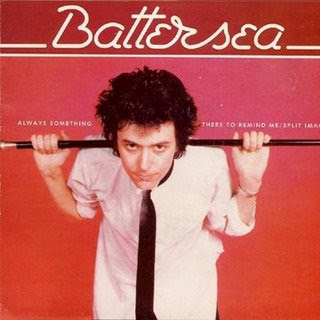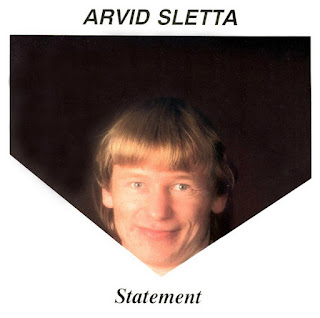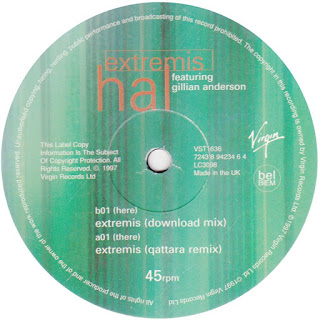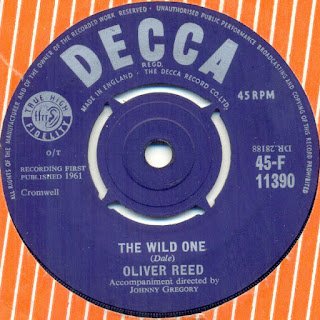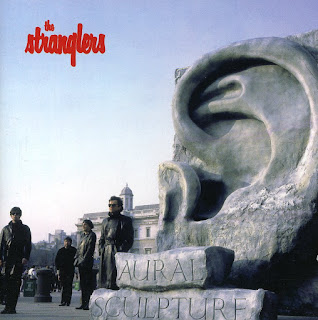Updated and, dare I say, authoritative: the Ellen Marty Story! Some of you will already know the bare bones of this (especially if you've read my first book), but read on anyway... it's worth it!
![]() One of the most wonderful things about immersing oneself in obscure and odd recordings is that occasionally you’ll rediscover an artist who has been criminally ignored - one whose genius seriously deserves reappraisal. That’s certainly true of the wonderful Ellen Marty, composer and chanteuse who released a series of what can only be described as eccentric 45s in the 1960s and 70s. There’s something wonderfully engaging about Ellen Marty, from her charming, almost naïve voice through to her unusual material and occasional odd choice of rhyming couplet.
One of the most wonderful things about immersing oneself in obscure and odd recordings is that occasionally you’ll rediscover an artist who has been criminally ignored - one whose genius seriously deserves reappraisal. That’s certainly true of the wonderful Ellen Marty, composer and chanteuse who released a series of what can only be described as eccentric 45s in the 1960s and 70s. There’s something wonderfully engaging about Ellen Marty, from her charming, almost naïve voice through to her unusual material and occasional odd choice of rhyming couplet.
Of Scandinavian descent, Ellen Marty's given name was Mary Ellen Mart. She was born in Centerville, South Dakota in 1935, the daughter of local electrical store owners Fred and Lenora Mart (nee Amundson). Fred had established his store, Mart’s Radio and Electrical, in 1928 and the couple married three years later. They named their firstborn after Fred’s sister, a nun: yes, Fred’s sister was Sister Mary Ellen Mart.
Educated at Centerville High School and the University of South Dakota, by 1960 Mary Ellen was in New York studying drama. After winning several acting awards while still in High School, the young Mary Ellen had grand plans to become an actress, and after moving to New York she appeared in at least two movies, Spring Affair in 1960 and House of Women in 1962. Her sojourn in New York didn’t last long, and by 1962 she was living in Hollywood.
Mary Ellen started writing songs at an early age, copyrighting her first five compositions in 1957. Upon moving to Hollywood and discovering how hard it was going to be to make it as an actress she started hawking her songs around various record companies, eventually coming to the attention of Joe Leahy. ‘I was pedalling my music around Hollywood and ran in to Joe’s office,’ she explains. ‘He was kind enough to listen to my tapes.’ A bandleader who was also a talented arranger, writer and producer, Leahy began his recording career in the late 40s and, in set up the Unique Records label in 1955 where he discovered the 14 year-old Canadian singer Priscilla Wright and had a sizeable hit with her debut waxing The Man in the Raincoat. Within a year TV, film and radio company RKO had purchased a 25 percent stake in the company, changing the name of the company to RKO/Unique; under that name the company that would issue Leona Anderson’s collection Music to Suffer By.
Leahy left Unique in April 1957 after selling the rest of his shares to RKO and, taking over the old Unique studio on New York’s Broadway, he established a new company, National, with several ex-Unique staffers. Before long he had moved to Felstead and then, in September 1959, to Dot - home, of course, of the doyenne of bad records Pat Boone. Working for Dot necessitated a move to Hollywood, where he also set up his own independent company RPC (Record Producers Corporation), with the intention of issuing nostalgia albums by ‘established movie and TV names’.
By now using the stage name Ellen Marty, her meeting with Joe Leahy was fortuitous; by 1963 (according to a report in the Sioux Falls Argus-Leaderwhich appeared on August 25, 1963) she had ‘contacted 15 recording companies and made at least eight different recordings’. That figure is easy to believe, as between 1957 and 1963 Ellen copyrighted 25 of her own compositions. ‘He heard a sound in my voice that he liked, and just like a flash we went in to a studio and recorded Man In a Raincoat’. Ellen nailed her vocal on the first take. She established her own publishing company, Lycklig, which had an office at 1216 Cole Ave, Los Angeles. Ellen chose the name Lycklig for her publishing company as it is the Norwegian word for 'happy'.
Joe was looking for his own studio, and he and Ellen recorded in several different places around Hollywood before he finally settled on the right space for him to work. Sadly, although the pair made some fantastic records together, the breakthrough hit eluded them. They established two different record labels, Marty and Rain Coat, but although Joe had an enviable track record and they employed Hollywood’s best pluggers they could not get the radio play that they so desperately needed. In 1965 she released her sole full-length album, Mixing and Making with Marty. Given three stars by Billboard magazine that LP - on which Ellen was backed by a stellar line up of musicians including drummer Hal Blaine and guitarist Bud Coleman - included her cover of The Man in the Raincoat (retitled Man In A Raincoat) which had first appeared as a 45 in 1963 on the Rain Coat label and was later reissued on the Marty imprint (Rain Coat’s offices were originally on Vine Street before moving to Lillian Way – immediately behind the Lycklig office). Ellen recorded two further albums, neither of which were issued: the first included Haciendo and Mesciando, a Spanish-language version of her song Mixing and Making. The unreleased (and untitled) collection was later reworked into a children’s album which including the 1966 recording A Sunbeam and a Dewdrop, and her single Baby Blue Eyes. Sadly this album also remains unreleased.
![]() After and a handful of great but criminally-ignored singles in 1966/67, including the brilliant Bobby Died Today (which, despite rumours to the contrary, has nothing whatsoever to do with the death of Bobby Kennedy) Ellen changed her stage name yet again, releasing her next five 45s under the name Buttons.Although she recorded several sides as Buttons there appears to be no connection between her and the female vocal act The Buttons who recorded for Dot and Columbia around the same time, nor with the act of the same name who recorded for RCA later in the 1960s. It is odd though that Joe was one of Dot's lead A&R men during The Buttons’ time at the label, and there is a distinct possibility that Ellen may have recorded as Buttons in an effort to emulate some of the success of The Buttons.
After and a handful of great but criminally-ignored singles in 1966/67, including the brilliant Bobby Died Today (which, despite rumours to the contrary, has nothing whatsoever to do with the death of Bobby Kennedy) Ellen changed her stage name yet again, releasing her next five 45s under the name Buttons.Although she recorded several sides as Buttons there appears to be no connection between her and the female vocal act The Buttons who recorded for Dot and Columbia around the same time, nor with the act of the same name who recorded for RCA later in the 1960s. It is odd though that Joe was one of Dot's lead A&R men during The Buttons’ time at the label, and there is a distinct possibility that Ellen may have recorded as Buttons in an effort to emulate some of the success of The Buttons.
Two of the tracks Ellen recorded (as Buttons) use the same backing tracks that Joe had previously used on a release by the actress Cynthia Pepper at Felstead: First Time Love and Baby Blues. Cynthia starred in the TV sitcom Margie, broadcast on ABC from September 1961 to April 1962, and the two songs, written by Joe, appeared on both sides of a 7” issued in August 1962. Cathy, who had previously appeared in the hit sitcom My Three Sons, would go on to star as Midge Riley in the Elvis Presley film Kissin’ Cousins. Six years later, with new lyrics written by Ellen, Baby Blues became Baby Blue Eyes and First Time Love became Lovetime. Joe also worked with 50s hitmaker Kathy Linden at Felstead and she also recorded for him at RPC, appearing on the Dick Powell album The Wonderful Teens (under the pseudonym Linda Wells) and releasing a one-off solo single in 1961. All three women had similar voices, and with singers using pseudonyms and Joe reusing music beds it’s more than possible that Ellen may have appeared on other releases during her years working with Joe.
Ellen Marty’s recordings are a delight: her voice is unconventional (to say the least), veering from a kittenish whisper (as on Lovetime) to that of a truculent teenager (vis Bobby Died Today) and she occasionally sounds as if she’s about to slit her wrists. Her lyrics are distinctly odd (The Barn is so Far From the Steeple starts off with the line On a day that was warm I decided to be born), and her sense of scansion and timing is often at odds with what pop record buyers are used to (as in the odd, hiccoughing rhythm of Give Me a Raincheck, Baby for example which, when I first heard it, had me rushing to check that the needle of my tone arm was not skipping across the precious vinyl), but the more of her work I discover the more in love with her I am becoming.
A Petal a Day/Baby Blue Eyes is a fine example of her slightly off-kilter world. I love the B-side, with its wailing police sirens and jaunty tack piano accompaniment, and the little giggle in Ellen’s voice towards the end is a real winner: it’s a far better record than the Cynthia Pepper original. The more subdued plug side, A Petal a Day, is a miserable little ditty about unrequited love whose lyrics clash ridiculously with the jolly backing track. It’s a suicide note sung to a fast food jingle. Locked Up And Bolted (which originally appeared as Locked Up and Bolded, resulting in some poor soul having to correct the labels on each disc by hand), the flip of the circa 1966 single Raindrops, is one of the most fun recordings you’ll ever hear, reminiscent of the Patrick Macnee/Honor Blackman song Let’s Keep It Friendly. The one thing you can say about Ellen’s material is that it genuinely deserves the epithet extraordinary. The one thing you can say about Ellen’s material is that it genuinely is out of the ordinary.
Try as she did, the hits did not happen. Things went quiet for a four-year period between 1969 and 1973 before she rocked up again, this time as Elie Marty. She released a single, again on Rain Coat, however this time her mentor Joe Leahy was not available to help out: ‘Joe was having health problems so I went out on my own,’ she says. One 45, Leave Me Like You Found Me/Some Days are Good (Somes Bad) using old music beds recorded by Joe in the 60s, was issued before Leahy passed away in 1974; Leave Me Like You Found Me utilises the same backing track as Such a Sad Face, the flip side of her 1968 release Little Mouse in the House. While back in Centerville to nurse her ailing mother, Elie met her parents’ neighbour Ron Backer, a former film editor and NASA employee who was also a keen painter. ‘He was visiting his Mom after he had lost his wife in a car accident,’ Elie explains. ‘It wasn’t long until I left Hollywood to go South and marry the boy next door!’
![]() The couple moved to Nashville so that Elie could continue recording, swapping her prestigious Hollywood address for a PO box in Music City. The unusual, beguiling voice is the same, but the quality of the songs – a cover of the 1920s standard Do You Ever Think of Me and Bob G Dean’s Paper Planes (later covered by Pat Alexis; Dean was the co-author of Stella Parton’s hit I Want To Hold You In My Dreams Tonight) among them – can’t hope to compare with the best of her 60s work. When that failed to provide her with a hit Ellen/Elie turned her back on her recording career. She did not give up music altogether, writing many news songs inspired by her husband’s depictions of historic events in US history. ‘Ron retired to become a full-time painter and we formed what we called “music around the paintings’. We came back to LA and did our little show to help Ron get more established with his art and it worked!’
The couple moved to Nashville so that Elie could continue recording, swapping her prestigious Hollywood address for a PO box in Music City. The unusual, beguiling voice is the same, but the quality of the songs – a cover of the 1920s standard Do You Ever Think of Me and Bob G Dean’s Paper Planes (later covered by Pat Alexis; Dean was the co-author of Stella Parton’s hit I Want To Hold You In My Dreams Tonight) among them – can’t hope to compare with the best of her 60s work. When that failed to provide her with a hit Ellen/Elie turned her back on her recording career. She did not give up music altogether, writing many news songs inspired by her husband’s depictions of historic events in US history. ‘Ron retired to become a full-time painter and we formed what we called “music around the paintings’. We came back to LA and did our little show to help Ron get more established with his art and it worked!’
Ron is an accomplished artist who has exhibited in many galleries across the States, and Elie often appeared at his exhibitions, singing the songs she wrote. Although the couple no longer do their shows they keep busy, and Elie continues to write and record to this day: ‘I still write country and western and the music I guess I’m known for. Part of my kitchen is like a recording studio’, she says. The former Lycklig offices – just a stone’s throw away from Hollywood Boulevard - are now part of an apartment complex.
The following is a list of all of the Ellen Marty/Buttons/Elie Marty releases and copyrighted songs I am currently aware of. Huge thanks to Elie herself for helping me complete this list:
Unrecorded: See Saw Love (© 1957)
Unrecorded: Doodle Lamb Daddy/Tired of Being What I’m Not/Yellow Trees (all © November 1957)
Unrecorded: I Shall Recall/If you Come Back to Me/I’ve Fallen in Love with You/Lonely/Lost Without You/Round the Bend/That Sammy Boy/Think a Little Thought (© Jan-June1958)
Unrecorded: I Still Cry/Sand Clock Love/Why Did you do It (© August 1958)
Unrecorded: Eddie, the Waiter/Worth a Wait (both © 1959)
Unrecorded: Democrats Now Are In Again/Lolita (both © 1960)
Unrecorded: Go Away Little Boy /Moment With the Lord/Moon Behind a Tree/Those Swayin’ Trees (all © 1961)
Unrecorded: One & A Two & A Three-a (© 1962)
Recorded, possibly unreleased: All of These Things You Are to Me (© 1959); Jungle Love (© 1961). Note: Jungle Love was recorded, according to Elie, by Carl Geren (possibly Carl Green?) for an album.
Raincoat 601: Man in the Raincoat/You're Such a Comfort to Me (1963) (PROMO)
Marty 101: Our First Date/Your Words Were Sweeter (1964)
Marty 102: Xmas Gift/I Wanna (1964) Note: Xmas Gift was copyrighted in 1957 as My Christmas Gift
Marty 103: Haciendo and Mesciando (Mixing and Making in Sparnish)/?
Marty 103: Mixing and Making/Johnny Had (1965)
Marty 601/602: Man in the Raincoat/This Time of Year (1964)
Raincoat 602: This Time of Year/Billy Back
Marty EM 101: Mixing and Making - Man In a Raincoat/You're Such a Comfort to Me/Johnny Had/I Wanna/This Time of Year//Our First Date/Don't Ask Me, Don't Bug Me/Your Words Were Sweeter/I Wish I Knew/Mixing & Making (1965)
Marty 603: Don't Ask Me, Don't Bug Me/This Time of Year (1964)
Raincoat 104: Forgive Me, Johnny/Love Is Fairytales
Marty 105: I Think I’ll Cry (You Lied, Lied, Lied Again)/I Will Come to You Some Night (1965)
Unrecorded: Sittin’ in This Chair/Super-Dooper-Ooper-Pooper (both © 1966)
Recorded, unreleased: A Sunbeam, A Dewdrop (© 1966)
Rain Coat 105: Raindrops/Locked Up and Bolted (label originally read Locked Up and Bolded) (1966)
Rain Coat 109: Bobby Died Today/Give Me a Raincheck, Baby (1966)
Raincoat 700: Cats Have Whiskers/It All Depends on You (1967) (as Buttons)
Rain Coat 701: Big Ben/Rain, Don’t Rain (both © 1967)
Rain Coat 702: A Petal a Day/Baby Blue Eyes (as Buttons) (1968)
Rain Coat 703: The Barn is So Far From the Steeple/Lovetime (as Buttons) (1968)
Rain Coat 704: Little Mouse in the House/Such a Sad Face (as Buttons) (1968)
Unrecorded: Be Still/Carousel/Every Now and Then/’Neath a Tree, Near the Sea/One Teardrop a Day/Railroad Tracks/So Afraid of Me/To Ride (all songs © 1968)
Unrecorded: EFILFOREVOL (Lover of Life)/Posse from my Past (both w Jared Warner, m Elie Marty) (© June 1973)
Rain Coat 705: unreleased
Rain Coat 706: Leave Me Like You Found Me/Some Days are Good (Somes Bad) (as Elie Marty) (1974)
Rain Coat 100: Do You Ever Think of Me/Paper Planes (as Elie Marty) (1977) (PROMO)
Unrecorded: Jesus Was a Baby Small (w Jared Warner, m Elie Marty) (© August 1977)
Recorded, not released: Motel Mornings (w Jared Warner, m Elie Marty) (© August 1977)
Unrecorded: Empty Saddle & A Stetson Hat (© 1982)
My thanks to Bengt Wahlstrom and to Elie Marty Backer for their help with this article.
Now, the good stuff. Not one, not two but 23 tracks by Ellen Marty, Elie Marty and Buttons. Everything I currently own copies of, in one handy zip file. It's all here, and you can download it from my Dropbox account so you should not have any issues with pop up ads or the like, and anyone should be able to download it without having to sign up for an account. If you're having issues just go to the page, click on the three dots in the top right hand corner and download.
Enjoy!
 Even though it was from the same stable that had produced the successful Sesame Street, the Muppet Show failed to spark in the States, and it wasn’t until ATV’s Lew Grade picked it up that it became a hit. The show debuted in the UK in September 1976, and Kermit, Miss Piggy, Fozzie Bear, the Great Gonzo, Animal and their friends were soon charming British audiences of all ages.
Even though it was from the same stable that had produced the successful Sesame Street, the Muppet Show failed to spark in the States, and it wasn’t until ATV’s Lew Grade picked it up that it became a hit. The show debuted in the UK in September 1976, and Kermit, Miss Piggy, Fozzie Bear, the Great Gonzo, Animal and their friends were soon charming British audiences of all ages.